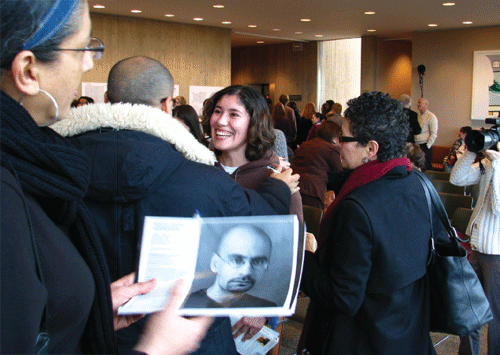Pulitzer winner Junot Díaz, MFA '95, comes back to the Hill
The morning after a fête in his honor, a sullen Junot Díaz enters the Statler Hotel lobby, scanning the front page of USA Today as if the headline reads Sic Transit Gloria Mundi and the message is expressly for him. Not that the Pulitzer Prize-winning author is unhappy to be back at Cornell— where as an MFA student he wrote Drown, a short story collection that landed him on the front page of Newsweek in 1996 as "a deserving dark horse" artist on the rise. No, in the first hours of that February morning, Díaz is experiencing something else: ambivalence. "Look, unless you're John Updike, the Pulitzer is a once-in-a-lifetime thing," says Díaz, MFA '95. "I know that and I am extremely grateful. But this book took me a long [expletive] time, man."
Eleven years, in fact—during which Díaz's bildungsroman-in-progress became a celebrated case of writer's block and the bane of his media interviews. When the New Yorker, where his short fiction frequently appears, touts you as one of the twenty-first century's top talents, certain expectations arise. "I wish I could [produce] more easily, but it's such a labor," he says. "It's hard for me to think that what I have to say is the most important thing in the world and just kiss my hands and get to work. Maybe some writers can do that. I can't."
The forty-year-old Díaz is the author of The Brief Wondrous Life of Oscar Wao, a debut novel whose protagonist is a fat ghetto nerd, a sexually deprived hopeless romantic who dreams of becoming the J. R. R. Tolkien of the Dominican Republic while coming of age in New Jersey. (The narrator is the ferocious, clever, and comedic Yunio, Díaz's fictional alter ego, who also strutted through the pages of Drown.) New York Times critic Michiko Kakutani described it as "funny, street-smart, and keenly observed . . . an extraordinarily vibrant book that's fueled by adrenaline-powered prose." The novel (whose title is a play on the Hemingway short story "The Short Happy Life of Francis Macomber") is laced with science fiction, gaming references, literary allusions, and footnotes on Dominican political history. After the final draft was off to the publisher, Díaz had no idea how it would fly. "When it was done, I just wanted my life back," he says. "I wanted the last eleven years back."

What Díaz got was the 2007 National Book Critics Circle Award for Fiction and the 2008 Pulitzer Prize, among other kudos. But for the record, his campus visit was set a month before the Pulitzer was announced, when the Cornell Council for the Arts selected him to receive the Eissner Artist of the Year Award. The ceremony coincided with a centennial celebration of creative writing at Cornell—so there he was, back on campus as the super-famous alum. And yet he finds public appearances excruciating. For a few hours the day before, he'd slipped downtown to browse the one mainstream independent bookstore left in Ithaca. "I'm just a regular José in a lot of ways," says Díaz, an associate professor of creative writing at MIT. "I needed to get away for a while to keep sane."
For all his discomfort with crowds, Díaz was more than accommodating during his visit to Cornell, presenting a tough-minded but amiable persona—or, rather, a variety of personas. There was the orator who liberally spiced his comments with the f-word. There was the seasoned writer who spoke of gratitude as being a cardinal sign of wisdom and maturity. (Like Drown, Wao has three pages of acknowledgements.) And there was the very unambivalent Díaz, delighting in face-to-face meetings with students, the majority of them Latino. "Junot worked as hard on his fiction as anyone who has ever passed through here," says English professor Stephanie Vaughn, "and not just writing but re-imagining his work, taking that extra step."
Another friend and mentor is English professor Helena Viramontes, who arrived at Cornell during Díaz's last semester; he asked her to review his thesis, the collection of stories that became Drown, then titled Negocios. "I remember getting through about half of the stories and I started crying—they were that good," says Viramontes. "I called Junot and told him I didn't think he would have any problem getting published."
Díaz once told Vaughn that he wanted to be the first famous Dominican who wasn't a baseball player. That wish has been granted; for a relatively young writer whose books number but two, he's racked up a stunning list of accomplishments. "I don't know, man," he says. "I look back on these last eleven years and wonder if there was something else I could have been doing. I really didn't know what I was getting myself into with all this. I've never known what it's like to leave a job at the end of the day and be done with it."
— Franklin Crawford


